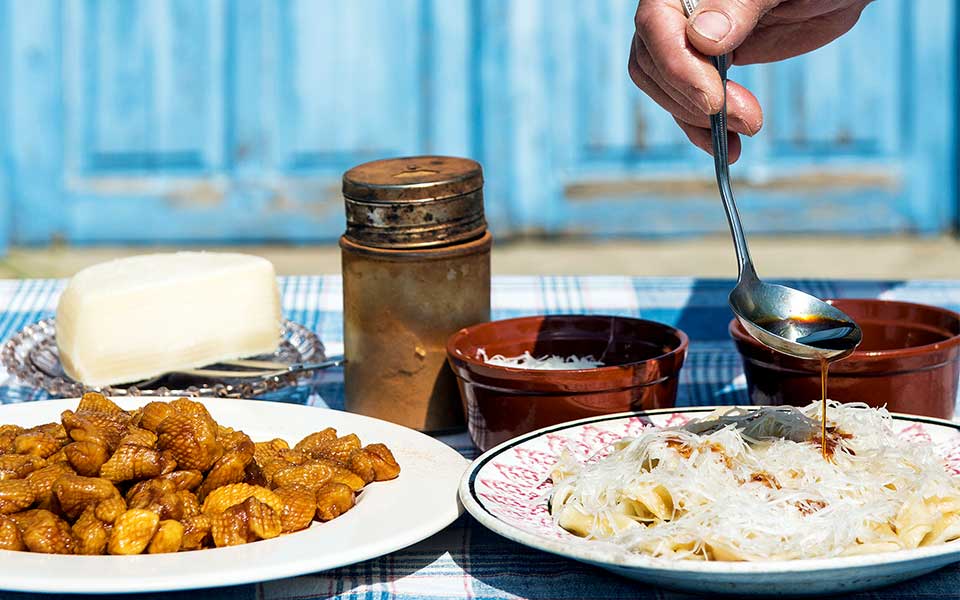Lasithi Xerotigana: Traditional Cretan Honey Rolls
In Crete, xerotigana are the quintessential...

© Perikles Merakos
About the Author: The late Evi Voutsina (1950-2013) was an acclaimed chef and food writer and a leading figure in the documentation and preservation of traditional Greek cuisine. This article was first published in Kathimerini newspaper.
When we talk about Greek food, we mean the country’s traditional cuisine, even though we tend to overlook the word “traditional,” which requires its own lengthy explanation.
A thankfully dwindling number of people still associate that word with the bygone era of looms, washboards and oil lamps, and with the smell of fresh dung. Why don’t we let it bring to mind the flavors and aromas of oregano, honey, good wine, bergamot, bitter-sweet grape syrup and myriad wild greens instead?
Many countries treat the notion of tradition in a similarly dismissive manner, but a further complication in Greece is that we have not defined the term “tradition” in an indisputable way. Fundamental questions remain unanswered, such as: How far back does our tradition stretch? Are we related to the ancient Greeks? Were we around in Byzantine times? What was our role during Ottoman rule? Did we have a culture then? And what happened after the establishment of the Greek state to make us forget our wild greens pies or our meat casseroles with quince, almonds and prunes? What separates us from our grandmothers who, in the blink of an eye, could roll out a hundred paper-thin sheets of pastry and throw together a tray of baklava?
I can’t open every chest of memories to see which of them contain treasures and which hold only ghosts, so let me pick up the thread of the story as close as possible to the present. Contrary to what many believe, tradition is a dynamic force. It evolves and it assimilates contemporary elements, sometimes slowly and sometimes quickly.
I remember Dimitris Papiris, an elderly man in the western seaside town of Preveza, telling me how he served a meze of octopus with quince at the ouzeri he had run since 1950. Noting my obvious skepticism, he politely reminded me how Greek cooking had changed, largely thanks to Ioannis Kapodistrias, the country’s first head of state after liberation.
“He’s the one who introduced potatoes to Greece,” said Papiris. “What do you think we used before then, if not quince, prunes and other fruits, almonds and raisins? My mother cooked meat with almonds, and it was so good, you’d lick your lips just thinking about it. Now we have potatoes that are easier, cheap and filling, and we’ve forgotten so many delicious dishes.”
I was too stunned to answer him.


Handmade pasta on Limnos
© Angelos Giotopoulos
Potatoes, tomatoes, peppers and corn are all things that came to Greece from the New World and were quickly assimilated into our cuisine, because they were hearty, easy-to-grow foods. They were soon in every kitchen, prepared using existing Greek cooking techniques and combined with ingredients that had always been around. A similar pattern is evident in other countries.
Like all traditional cuisines, however, the cooking of Greece has certain principles that never change. These are often related to climatic conditions and matters of economy. Greek cuisine, for example, respects seasonality and uses products when they are at their finest. As much as we may love stuffed cabbage leaves, for example, we won’t make them in April or May, when the spring garden brings us fresh peas, artichokes, heady fennel, asparagus and broad beans.
Authentic Greek cuisine is always about striking a balance. The sweetness of peas, for example, is offset by a bit of sour plum. Readers may argue that you cannot always find fresh plums, but they forget that the market is shaped by demand. If enough people ask for a thing, it will eventually appear. Look at petimezi (grape syrup), which was almost forgotten some 15 years ago but now can be purchased in every supermarket and grocery store.
Tradition changes as it flows through time, picking up new elements and adapting, but it also retains its core identity. And the message that modern man must heed is that, ultimately, it’s all about management.
How many people, for example, know that you can make a wonderful salad from the peppery young leaves of the tomato plant, the broad bean or the onion? “I’m waiting for the beans to ripen but, until they do, I can enjoy the sweetness of their leaves,” I recall a woman from Thrace telling me.
It’s smart to make the most of what’s at hand, but it’s also important to adjust to new circumstances. “I used to make a big pot of trachanas (a fermented cracked wheat dish) every morning and I would add cheese and bread to it,” a woman from western Macedonia told me. “My husband would have some wine with his food, and then we’d go to the fields, taking some bread with cheese or olives. These days, I still make trachanas for breakfast because we like it, but we only eat a small bowl, because the work is so much easier, thanks to the tractor.”
This makes sense. Most people nowadays who live in cities and spend hours sitting don’t use as much olive oil with their peas or their artichokes as their grandparents once did.
We adapt to the times, and this is precisely the point of tradition: changing to meet new needs but keeping the core identity, the principles of Greek food, intact.
In Crete, xerotigana are the quintessential...
Since 1928, this family-run wine taverna...
This article explores four cozy Greek...
Among the many city eateries offering...